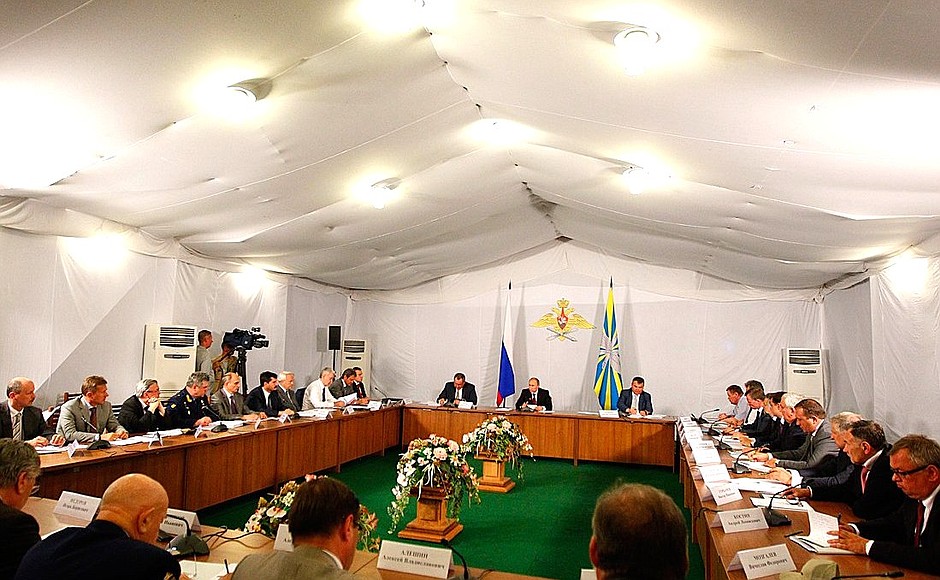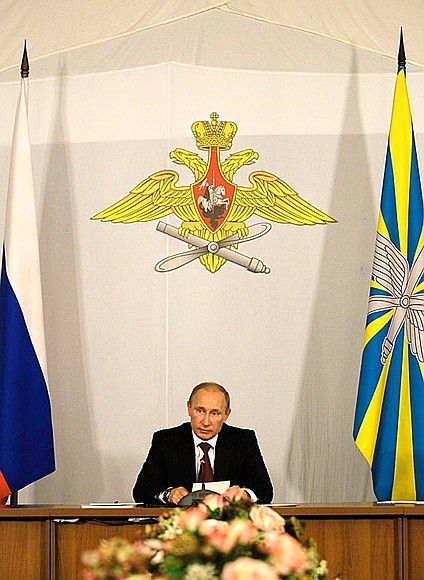Vladimir Putin noted that aviation is a key element of the country’s defence and stressed that the celebration of the 100th anniversary of the Air Force should be used to boost the morale in military aviation. The President set the task of raising the prestige of the flight, engineering and technical professions, enhancing educational projects and programmes to promote Russian aviation.
* * *
President of Russia Vladimir Putin: Good afternoon, colleagues,
In 2012 we will celebrate 100 years of national military aviation. This is an important milestone in the Russian military history and an integral part of our national memory. We must celebrate this anniversary with dignity and respect for the achievements and feats of several generations of pilots, engineers and aircraft manufacturing companies’ workers, who created the glorious heroic annals of the Russian Air Force and those traditions that are today and will remain in the future a solid pillar of the Russian Armed Forces.
I consider it symbolic that we are holding our meeting at one of the best Air Force bases in the Southern Military District, which was decorated with the Order of Kutuzov today. The history of Russian Air Force is woven out of stories of such famous units and the biographies of talented and courageous people, the true patriots of our country.
Our outstanding designers Sikorsky, Mikoyan, Tupolev, Ilyushin, Mil, Sukhoi and Kamov launched the world-famous brands of planes and helicopters. The most complex elements of aerobatics bear the names of Russian pilots. They set dozens of international records in distance, speed and altitude. The brightest pages of history belong to intercontinental flights, for example, the flight over the North Pole (incidentally, we will be celebrating the 75th anniversary of that flight this year) and other legendary exploits of our pilots, such as Nesterov, Chkalov, Lebedinsky, Pokryshkin and Kozhedub.
See also
Military pilots were the first to be awarded the title of Hero of the Soviet Union. Only during the Great Patriotic War, the highest title in our homeland was conferred to more than 2,500 pilots; 228 air units and formations became guards units, and 897 were awarded military orders. Military pilots made up the core of the first cosmonaut squadron in our country. And it was a military pilot, Yury Gagarin, who became the first man in space.
Today, the Air Force plays a critical role in national defence and state security. The importance of military aviation in the Armed Forces structure and in increasing Russia’s combat capability will gradually increase in the coming years. By 2020, the Air Force will get more than 600 planes and a thousand helicopters. I have just met with personnel here at the base, and the officers asked me: What is going to happen to aviation? By 2020, the Air Force will get 600 new planes and a thousand helicopters.
Systems with improved combat characteristics have already begun to come into service. Major air bases are being established in the Air Force, such as the one that will be established here, with a strong infrastructure and upgraded airfield network. In the past four years, we have overhauled seven airfields per year, which makes a total of 28.
Accordingly, we will significantly upgrade and expand the capacity of defence aircraft manufacturing companies, provide advanced training for pilots, technicians and engineers, and, what is vitally important, inspire young people to dream about the skies, and raise the prestige of pilots, engineers and technicians. I think this is one of the most important tasks set out in the proposed programme for the celebrations of the 100th anniversary of the Russian Air Force.
I would like to highlight a few points in this regard.
First. It is important to set the right tone for the upcoming events, make them interesting for the public, both in Russia and abroad. To achieve this, I believe it is essential to ensure extensive coverage of the anniversary by the Russian mass media, to provide up-to-date and full information on all the ongoing and planned activities to the world's leading information agencies, newspapers, television and radio networks, and online media outlets. International exhibitions and forums should make a major contribution to this effort, starting with MAKS, the traditional and largest Russian air show.
Second. Given the importance of the anniversary, the celebrations programme must be extended to all Russian regions, and I ask you to get regional and local authorities more actively involved in the upcoming events; I also count on the participation of the interested public and youth organisations.
Third. Particular attention should be paid to veterans of military aviation and the aviation industry as a whole, those who defended the skies over our Motherland, created and tested unique equipment. I know that such work is carried out through aviation unions and some NGOs, but I think you will agree that we need to expand this list further.
Fourth. We must provide support for the enthusiasts who study Russian aviation history, do research, painstakingly restore legendary aircraft designs of the past years, work in archives, and restore our heroes’ names to living memory. Such civic, patriotic, active initiatives coming from people’s hearts must receive our support. They bring more good than official and formal events.
Finally, special attention must be paid to educational projects and programmes aimed at popularising the achievements of Russian aviation. Together with the historical component it is vital to show the intellectual, science-based potential of the Russian aircraft industry today and its prospects, to talk more about modern life in the Air Force, the hard, responsible work and the service of our military pilots protecting the skies over Russia.
<…>

